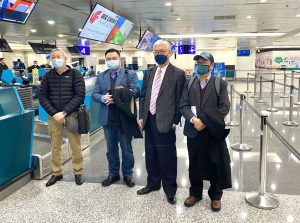The vice chair of Beijing-friendly opposition party Kuomintang (KMT) from Taiwan was visiting China for meetings with officials and the local business community, drawing criticism from the self-governing island’s ruling party.
Andrew Hsia’s nine-day trip, from February 8 to 17, comes as China renews attacks on the ruling Democratic Progressive Party over its refusal to recognize Taiwan as a part of China.
Spokesperson for the Chinese Cabinet’s Taiwan Affairs Office Zhu Fenglian accused the DPP of acting “out of selfish political interest” in seeking the island’s formal independence with foreign support.
Those actions “damage the Taiwan compatriots’ interests and well-being, endangers their safety and security, and gradually push Taiwan to a dangerous stage,” Zhu said, in a reference to China’s threat to use force to recover what it considers Chinese territory.
The sides split amid civil war in 1949, and Taiwan has never been governed by China’s ruling Communist Party.
Tensions between China and Taiwan have increased following a stream of visits by foreign parliamentarians and others to the island, including a possible upcoming trip by U.S. House Speaker Kevin McCarthy.
In August 2022, China fired missiles and held threatening war games around Taiwan in response to a visit by then-House Speaker Nancy Pelosi, who became the most senior U.S. official to visit Taiwan in 25 years.
Hsia embarked on a visit to China shortly after the military drills, sparking anger and criticism even from within the KMT.
Despite their close economic ties, China has refused all contact with Taiwan’s government since President Tsai Ing-wen of the DPP first took office in 2016 over her refusal to recognize the concept of “one-China” embodied in an earlier agreement brokered by the KMT and Chinese Communist Party known as the “’92 Consensus.”
In contrast, Zhu said China welcomed Hsia’s visit, saying Beijing is “willing to strengthen exchanges with the KMT, consolidate and enhance mutual trust, and deepen exchanges and cooperation in various fields on the common political foundation of adhering to the ’92 Consensus and opposing Taiwan independence.”
The vast majority of Taiwan’s 23 million people support the status quo of de facto independence and Tsai says there is no need to make a formal declaration that would likely spark a military response from China.
Hsia plans to visit Shanghai, Nanjing, Wuhan, Chongqing, and Chengdu, and meet with head of the Taiwan Affairs Office, Song Tao, the KMT said. His meetings with the business community will focus on restoring air and sea links between the sides that were suspended during the COVID-19 pandemic.
The DPP criticized the trip, saying Monday that it would lead to “unnecessary speculation” internationally, Taiwan’s official Central News Agency reported.
Hsia should not sacrifice Taiwan’s interests while “rushing to demonstrate loyalty to China,” the DPP said.
Hsia, however, insisted that his trip did not have any “political purpose” and emphasized that, as an opposition leader, he could not “negotiate” or reach any agreements. Instead, he positioned his trip as in alignment with Tsai’s recent call to strengthen cross-strait exchanges and dialogue.
The visit also comes amid a new downturn in relations between China and the United States, Taiwan’s chief backer, over the presence of a suspected Chinese spy balloon in American airspace.
The U.S. military shot down the unmanned airship on Saturday and U.S. Secretary of State Antony Blinken canceled his visit to Beijing, prompting angry complaints from China over what it called an overreaction. China insists the object was a civilian balloon intended for meteorological research that had been blown off course.
Asked by reporters about the “sensitive” timing of the trip, Hsia replied: “Many people will say that there’s never a suitable time. The more dangerous the situation is, the more the need to go.” He pointed to the previous example of his trip to China last August, saying, “Everyone said it was not suitable, but we went to express our thoughts, and the results were good.”
Hsia added that the spy balloon incident is “a matter between mainland China and the United States, and has little to do with us.”

































